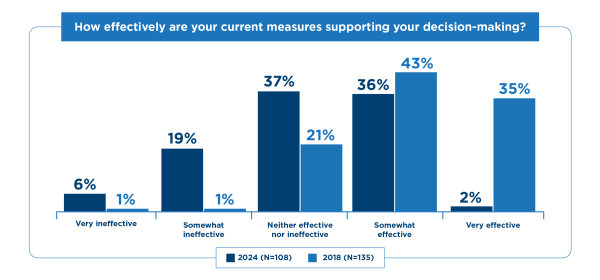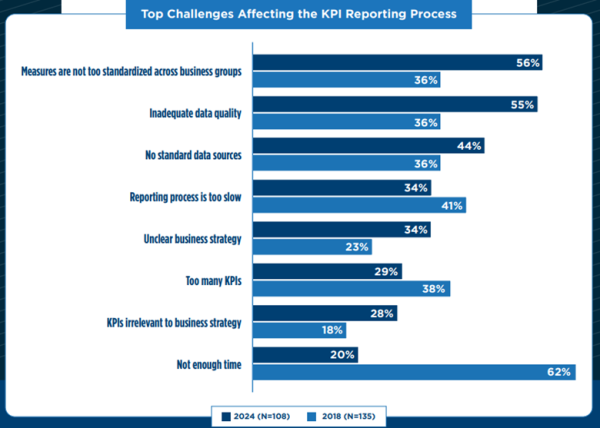
A key performance indicator (KPI) is a specific measure used to gauge a quantifiable component of an organization’s performance at the functional, process, or activity level. KPIs typically correspond to the organization’s critical success factors and business goals.
APQC conducted a survey to understand the common challenges and priorities associated with operational KPIs for process and performance management (PPM) practitioners in 2024. Through our research, we found that organizations generally have a variety of KPIs to meet a wide range of strategic objectives, and the top five reasons organizations use KPIs are:
- Improving performance (48%)
- Ensuring quality and consistency (46%)
- Optimizing resource utilization (44%)
- Reducing cost (44%)
- Boosting revenue (33%)
Effectiveness of KPIs
In the survey, we asked participants how effective they feel their current measures are in supporting their decision-making, and only 38% feel that they are effective or very effective, leaving some room for improvement. When asked what challenges affected the KPI reporting processes, organizations responded with the following:
- Measures are not standardized across business groups (56%) - Without standardization, the reporting of performance measures carries less weight. Organizations should consider standardized benchmarks and measures in order to compare their performance to other business units that are engaged in the same type of activity and identify opportunities for innovation.
- Inadequate data quality (55%) – Organizations should spend time looking into data management and governance in their organization. Effective data governance can break down silos, improve management and reporting, and enhance process alignment.
- No standard data sources (44%)
- Reporting process is too slow (34%)
- Unclear business strategy (34%)
- Too many KPIs (29%) - Organizations continue to struggle with picking the best fit measures as generating a well-balanced set of measures requires input and expertise across the organization, from key stakeholders to process owners and beyond. Choosing the right measures is a critical step in providing actionable insights into an organization’s performance, helping to identify current challenges and opportunities, and aligning with the organization’s culture and strategic goals.
- KPIs irrelevant to business strategy (28%) - For measurement to provide real value, an organization must ensure that its measures align with both the strategic goals of the business and employees’ daily work. APQC's Measurement Alignment Worksheet helps organizations accomplish this task by providing a simple format to map the links between strategy, processes, performance, and measures.
- Not enough time (20%)
Trends Over the Years
APQC conducted a survey with similar questions in 2018, and it was interesting to compare the data and see what has changed, and what stayed the same over the years.
There is a marked difference in how organizations perceive the effectiveness of KPIs in helping with decision making. Respondents in 2024 were far less likely to say that KPIs are very effective or somewhat effective in aiding their decision-making, instead tending to remain neutral or negative about their effectiveness.
When asked what challenges affect the KPI reporting process, as mentioned above, respondents in 2024 said that the lack of measure standardization across business groups was the top challenge. It’s interesting to note that in 2018, the biggest challenge was not enough time, whereas now the primary challenge is standardization. The process in 2018 seemed to take too long and people didn’t have enough time to complete it; versus now it appears that people have a lot of data; however, it’s not standardized, the quality is questionable, and there is a lack of clear data sources.
Learn More
KPIs are essential for organizations to be able to understand how they are performing, compare their performance over time, and benchmark with other business units and other organizations. Learn more about our research on operational KPIs in our content collection, 2024 Operational KPI Priorities & Challenges.

